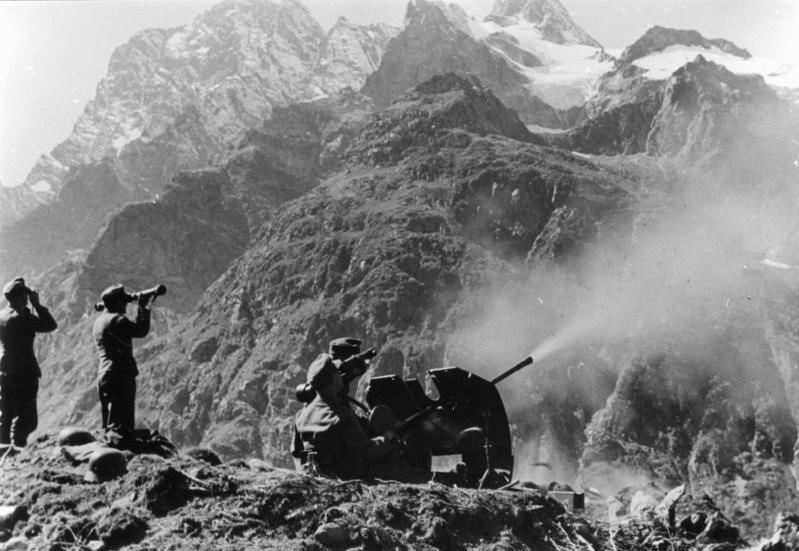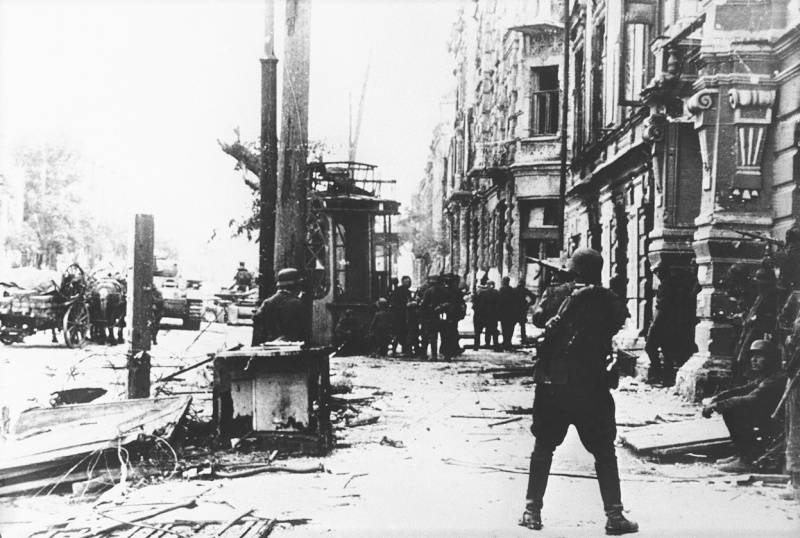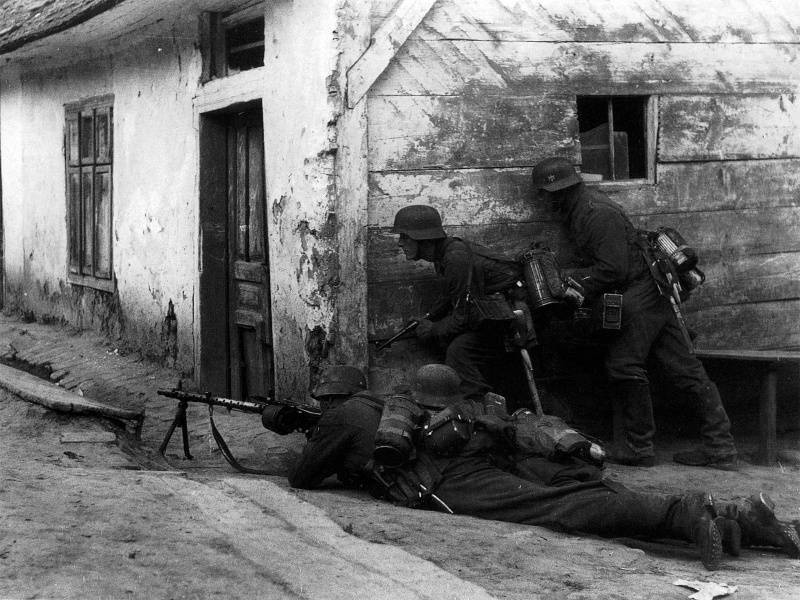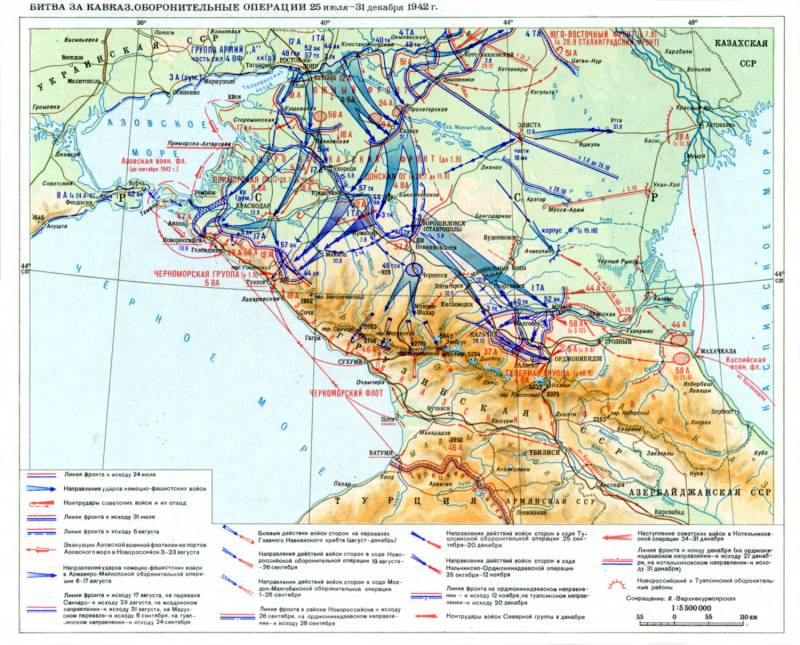How the Wehrmacht stormed the Caucasus

75 years ago, 25 July 1942, the battle for the Caucasus began. The Caucasian operation, which took place simultaneously with the Stalingrad and Kursk battles, played an important role in creating and completing a radical change in the course of the Great Patriotic War in favor of the Soviet Union.
Carrying out its main strategic plan for the summer campaign of 1942 to crush the Soviet armed forces, seize the most important military-economic centers of the USSR, which led to victory in the war, German troops launched an operation to seize the Caucasus simultaneously with the attack on Stalingrad.
The battle for the Caucasus became one of the longest in the Great Patriotic War. It lasted 442 days, from July 25, 1942 to October 9, 1943. It was a series of defensive and offensive operations carried out on a vast territory in difficult conditions of steppe, mountain and mountainous-forested areas, as well as on the Black Sea coast. The main components of the Caucasian battle were: the North Caucasus strategic defensive operation, which lasted more than five months, the North Caucasian strategic offensive operation, the Novorossiysk landing operation, the Krasnodar and Novorossiysk-Taman offensive operations, which lasted a total of more than nine months. During these operations, the Red Army (Southern, North Caucasian and Transcaucasian Fronts together with the NKVD troops) in cooperation with the forces of the Black Sea fleetIn the fierce battles and battles, the Azov and Caspian military flotillas exhausted the formations of the German Army Group “A”, stopped their advance and defeated them, knocked them out of the Caucasus.
Value of the Caucasus
In the 1940-s of Baku (Transcaucasia) and the North Caucasus were the largest sources of oil in the Eastern hemisphere. In those days, the USSR occupied the second place in the world in oil production, producing a tenth of all the oil in the world. Germany, which was experiencing an acute shortage of petroleum products throughout the war, was striving at all costs to capture this region. There were also reserves of other strategic raw materials, for example, tungsten-molybdenum ore. In addition, the loss of the Caucasus would have left the Soviet Union almost without oil at all, since only 12% of oil was mined outside the Caucasus. Not surprisingly, Adolf Hitler attached such importance to the Caucasus. At a meeting in Poltava in June 1942, Hitler stated: “If we fail to capture the oil of Maikop and Grozny, then we will have to stop the war!”
In Berlin, it was hoped that the breakthrough of the Wehrmacht in Transcaucasia would lead to the entry of Turkey into the war on the side of Germany. Turkey at the beginning of the war took a hostile position against the USSR, but was still cautious. The Turkish army was focused on the Caucasus, which forced Moscow to keep a large grouping of troops in the region in order to protect the Caucasus and important communications going through Iran. In Iran, where the nationalist elite was leaning toward an alliance with Germany, with the start of the war, Soviet and British forces were introduced. In Berlin, hoping to occupy the Caucasus, to penetrate into the Middle and Near East, into Central and South-East Asia. In addition, the Nazis pinned high hopes on the divisions, which, according to their calculations, were to arise between the peoples of the Caucasus and the uprising against the "Russian occupation". The local peoples were to supply the Eternal Reich with auxiliary military units and become a reserve of cheap labor for the German economy. However, thanks to the skillful actions of the Soviet leadership (in particular, the operation “Lentils”), these plans could not be realized. It is worth considering that in the pre-war years a lot of work was done to eliminate the “fifth column” in the USSR, including the ethnic separatists.
Plans to turn the Caucasus into a colony of Germany were voiced during the First World War and, in general, retained their significance during the Third Reich. The German generals Ludendorff and Hindenburg saw in Ukraine and the Caucasus suppliers of raw materials for German industry, sources of replenishing their armed forces with new formations - “cannon fodder” and, finally, a reserve of cheap labor. It should be noted that modern Ukraine, by these signs, is already a real colony of the West. Also, the Caucasus needed Berlin as a strategic springboard for influencing Turkey, Iran, and the spread of German influence in the Middle East, Central and South-East Asia.
Thus, the Caucasus needed the supreme German command in order to: 1) get the strategic resources necessary to continue the world war and create a world empire; 2) for access to the Near and Middle East, to areas of Central and Southeast Asia; 3) deprive Moscow of an important economic region, as well as a reference center for the Red Army, the Air Force and the Black Sea Fleet; 4) destroy Russia, raising against her Caucasian peoples. Therefore, the German command concentrated the main efforts during the 1942 campaign of the year on the southern sector of the front.
It is difficult to overestimate the importance of the Caucasus in the life of the Soviet Union. The presence of rich reserves of minerals and fertile lands made the Caucasus the most important source of industrial and military-strategic raw materials, one of the country's food bases (especially given the loss of agricultural areas of Ukraine, Crimea and Belarus). During the years of Soviet power, the Caucasus from the agrarian outskirts of Russia became an important industrial region. During the years of the prewar five-year plans, the industry of the Transcaucasian republics has grown significantly. Hundreds of new heavy and light industrial enterprises were built in the Caucasus. Much attention was paid to the expansion of oil production and refining, the most important strategic product of the Caucasus. Only in the Baku region for the period from 1934 to 1940, the drilling of 235 new wells was started (Socialist national economy of the USSR in 1933-1940 M., 1963.). In total, 1940 new wells were commissioned in the Caucasus by 1726. This accounted for about 73,5% of all wells entered by this time in the USSR. Thus, oil production in the Caucasus before the Great Patriotic War increased significantly. A special role was played by the Baku oil-bearing region, the largest in the Union.
Along with the development of the oil industry, much attention was paid to the development of natural gas fields. As a result, the gas industry of Azerbaijan, together with other areas of the Caucasus in 1940, gave the national economy and population about 2,5 billion cubic meters of natural gas. This amounted to about 65% of all-union gas production. A large development in the Caucasus was received by the electric power base. Before the war, new power plants of union and local importance were built here. The development of manganese ore in Georgia in the pre-war years was of great economic and military-strategic importance. Chiatura Mine produced in 1940 1448,7 thousand tons of manganese ore. This amounted to about 56,5% of the all-Union production of manganese ore. Of great importance was agriculture. The North Caucasus and Kuban were among the richest regions of the country for the production of wheat, corn, sunflower, and sugar beet. Cotton, sugar beet, tobacco, grapes, tea leaves, citrus and oil-bearing crops are grown in the republics of the Transcaucasus. A good fodder base allowed developing livestock. In the pre-war years, the light and food industries were actively developed on the basis of agricultural raw materials. The Caucasus and its ports on the Black and Caspian Seas during the pre-war period were of paramount importance in the USSR’s foreign trade: 55% of all exports and 50% of USSR imports went through southern, including Caucasian, ports. Communications of the Caspian and Black Seas linked the USSR with Turkey and Iran, and through them with the world's ocean routes. Thus, during the Great Patriotic War, trade routes running through the Persian Gulf, Iran and the Caspian Sea, took the second place in the supply of arms, ammunition and food, as well as strategic raw materials from the United States and the British Empire.
The military-strategic importance of the Caucasus was determined not only by the presence of large reserves of oil and other types of strategic raw materials, not only by the mobilization capabilities of human resources, but also by an advantageous geographical position. The Caucasus was a strategic base for access to Asia Minor (Turkey), to the Near and Middle East. The Caspian Sea, located mainly on the territory of the USSR, connected the Caucasus with the Soviet republics of Central Asia with its water communications, and through the Volga with the central regions of the country. The southern part of the Caspian Sea enters the territory of Iran. A major role in the strategic characteristics of the Caucasus is played by the Black Sea. After the loss of the Crimea, the coast of the Caucasus became the main base of the Black Sea Fleet.
It is clear that the loss of the Caucasus (together with the Volga route) would have been for the USSR, if not fatal, then a very heavy blow, comparable to the loss of Ukraine, or the possible fall of Leningrad or Moscow.
Caucasus in German plans
Hitler's directive No. 21 from 18 December 1940 did not say anything about the Caucasus. Based on the idea of a lightning war, in Berlin they believed that the destruction of the main Soviet forces from the troops located in the western part of the USSR, the seizure of the territory of the Baltic States, Belarus and Ukraine, the Wehrmacht to Moscow and Leningrad would lead to the collapse of the Union and to the almost unhindered mastery of the Third Reich territories. In this case, the operation to seize the Caucasus and Baku would not be necessary. However, the 1941 campaign of the year did not lead to a quick victory. And in the summer of 1941, German strategists began to make adjustments to the plan of war.
So, in addition to the OKB directive No. 33 of July 12, 1941, the necessity of attacking the Caucasus was emphasized. “As soon as the operational situation and material and technical support allow,” the directive said, “1st and 2nd tank the groups subordinated to the command of the 4th Panzer Army, together with the infantry and mountain rifle divisions following them, should launch an attack through the Don into the Caucasus after taking control of the Kharkov industrial region. ” In addition to the OKB directive No. 34 dated 12.8 1941, the southern wing of the German eastern front was tasked with capturing the Crimea, which was also considered as a springboard for the operation to capture the Caucasus. The same addendum to Directive No. 34 prudently indicated the need to send mountain rifle troops to the Crimea and “check the possibility of their use for crossing the Kerch Strait and in the further offensive in the direction of Batumi”.
When it finally became clear that the war was being delayed, there were two points of view on the further campaign in the supreme German command. The ground forces commander proposed to continue the advance of the main forces in the central (Moscow) strategic direction. Hitler proposed a strategy of successive tank strikes on the flanks in order to seize the Crimea, the Donbass on the southern part of the Soviet-German front, to deprive the Soviet country of the possibility of obtaining oil from the Caucasus and together with the Finnish army crush Leningrad in the north. About the solution of these problems spoke Hitler's directive from 21 August 1941, the commander-in-chief of the ground forces. It emphasized the importance of the fastest capture of the Crimea, the Donbass by the German troops, and penetration into the Caucasus.
Hitler’s note on 22 in August 1941 to the Army High Command noted that the final destruction of Russia as a continental power can only be achieved by destroying the Russian armed forces and seizing or destroying the economic base on which they are based. "... For reasons of a political nature, it is imperative to quickly go to areas where Russia receives oil, not only to deprive it of this oil, but above all to give Iran hope that it will be possible in the near future assistance from the Germans in the case of resistance to threats from the Russians and the British. In the light of the aforementioned task ... - noted later in the note, - the problem of Moscow in its significance substantially recedes into the background. ”
Later, the German generals, trying to blame Hitler for defeat in the war, will speak about the “fatal mistake of the Führer” - transferring the main efforts of the Wehrmacht from the Moscow strategic direction to the south. They created the myth of one-sided - economic, political and strategic - decisions of Hitler. Thus, General Günther Blumentritt, the main cause of the “unfortunate consequences” in the battle of Moscow, calls Hitler’s “economic” position in his approach to the strategy of war. “Hitler,” he wrote, “approached the war from a purely economic position. He wanted to take possession of the rich bread Ukraine, the industrial Donets Basin, and then the Caucasian oil ”(Fatal decisions. M., 1958.).
However, a significant part of the German generals also saw a way out in transferring their main efforts to the southern flank of the Soviet-German front. The Wehrmacht could no longer, as in the 1941 campaign of the year, launch a decisive offensive in three strategic directions. In addition, it was in the Moscow sector that the Soviet Headquarters and the General Staff were waiting for the main blow of the enemy, here were the main strategic reserves of the Red Army. In the south, the Wehrmacht could have achieved decisive success. “The implementation of these intentions,” wrote the Chief of Staff of the Ground Forces (1942-1944) General Kurt Zeitzler, “would certainly be of great importance. If the German army were able to force the Volga in the region of Stalingrad and thus cut the main Russian communication line going from north to south, and if Caucasian oil went to meet Germany’s military needs, then the situation in the East would be radically changed and our hopes for a favorable outcome of the war would have greatly increased. " “Having achieved these goals,” Zeitler wrote, referring to the seizure of the Caucasus, “he wanted to send highly mobile units to India through the Caucasus or by other means.” Thus, not only Hitler and his headquarters, but also representatives of the Army High Command pinned great hopes on the Caucasus.
The essence of the strategic plan for the 1942 summer campaign was officially set out in Hitler's directive No. 41 of 5 in April of 1942 (Operation Blau). The general plan of the Wehrmacht’s high command was to hold the position it occupied on the central sector of the Soviet-German front, with successive strikes on the southern wing to crush the flank groups of the Soviet troops, seize the Leningrad forces with liberated forces and establish communications overland with the Finnish army and then break through to the Caucasus . “Therefore,” the directive said, “first of all, all available forces should be concentrated to carry out the main operation in the southern sector in order to destroy the enemy west of the Don, in order to then seize oil-bearing regions in the Caucasus and cross the Caucasus Range (G. Durr Hike to Stalingrad. M., 1957.). 1 June 1942, in Poltava, Hitler approved a plan for a new general offensive at a meeting of the high command. The Fuhrer said that if he did not get the oil of Maikop and Grozny, he would have to stop the war.
Plan "Edelweiss"
In the spring and summer of 1942, the Wehrmacht created the conditions for a breakthrough to the Caucasus. German troops captured the Crimea, including Sevastopol. The unsuccessful offensive of the Red Army near Kharkov led to the catastrophe and a serious weakening of the southern flank of the Red Army. 7 July 1942 Army Group South was divided into Army Group A (attack on the Caucasus) under Field Marshal Liszt and Army Group B (attack on Stalingrad) under Field Marshal von Bock (then von Weichs). 28-30 June, German troops broke through the defenses of the Bryansk and Southwestern fronts. The Wehrmacht went to the Don, forced it and captured part of Voronezh. Developing the offensive, the German troops advanced to Novocherkassk, Rostov-on-Don and Stalingrad. The troops of the South-Western Front with heavy fighting went to the Don, to Stalingrad, the troops of the Southern Front - to the lower Don.
In early July, 1942, German troops reached the Don along its entire length, from Voronezh to the mouth, with the exception of a large bend west of Stalingrad. 17-I German army forced the Don and in 25 July captured Rostov-on-Don. Two days before that, Hitler had signed directive No. 45 “On the continuation of Operation Braunschweig.” General Paulus was ordered to take Stalingrad, then turn south and develop an offensive along the Volga towards Astrakhan and further down to the Caspian Sea. Army Group "A" was given the task of attacking the Caucasus, with part of the forces of the 13 Tank Army transferred to it on July 4.
Obviously overestimating his successes, Hitler believed that the Russians were at the limit of their forces and brought the last reserves into battle, that favorable conditions were created for the simultaneous attack on Stalingrad - Astrakhan and the Caucasus. The main forces were thrown on the conquest of the Caucasus. Contrary to the advice of Halder, the Führer threw both tank armies south and took the tank corps from Paulus, which, in turn, could not but affect the pace of advance of the 6 army to Stalingrad. In addition, considering that the existing forces in the south are enough to take Stalingrad and capture the Caucasus, the Fuhrer sent Manstein's 11 Army near Leningrad with the task of establishing contact with the Finnish army, seizing the city "and leveling it with the ground." Two motorized SS divisions from Army Group A, Hitler transferred to France and Army Group Center (Adolf Hitler, Great Germany), two tank divisions from Group B (9 and 11) ) - to the army group "Center". In total, by the end of July, 11 German divisions, including 2 tank and 2 motorized, were withdrawn from the main line.
Thus, if 28 June 1942 of the year, the 800 German divisions and 68 allied divisions were concentrated on the 26 km front on the 1 front, then all 57 German and 36 allied divisions were available for 1200 in August. The front line at this point was already about XNUMX km. Nominally, the total number of connections remained the same, but the Italian, Hungarian and Romanian units were significantly weaker than the German ones, both in combat spirit, in the quality of combat training, and in armament, in the material part.
Colonel-General Halder 23 July wrote in his diary: “... the still underestimation of enemy capabilities takes grotesque forms and becomes dangerous ... Serious work is out of the question. The painful reaction to the instant impressions and the underscoring of the deficiencies in the evaluation of the governing apparatus and its capabilities alone is what determines the character of this so-called leadership. ”
Army Group A now included: Col. Gen. Ewald von Kleist's 1 Tank Army, Colonel-General German Goth's 4 Panzer Army, Colonel General Richard Ruoff's 17 Army, General Roman 3 Army. Dumitrescu. By the beginning of the new offensive, the group had 40 divisions: 18 infantry, 4 tank, 3 motorized, 6 mountain rifle, 3 light infantry, 4 cavalry and 2 security. Romanian divisions were part of the German associations: 4 divisions - in the army of Goth, 3 - in the submission of Ruoff. There were a total of more than 170 thousand soldiers and officers, 1130 tanks, 4540 guns and mortars at the disposal of Field Marshal Liszt, up to 1000 aircraft of the 4 air fleet (part of the aircraft operated on the Stalingrad direction). These troops had high combat capability, were impressed by the latest victories. Many of their units participated in the defeat of the Soviet troops near Kharkov and south-west of Voronezh, in the June battles.
The immediate task of Army Group A was to encircle and destroy the Soviet troops that had departed beyond the Don, south and southeast of Rostov. For this, the Germans intended to use strike groups of mobile units that were to attack from bridgeheads in the Konstantinovskaya and Tsimlyansk areas in the general direction of Tikhoretsk, as well as infantry divisions from Rostov. After the seizure of the North Caucasus, according to the Edelweiss plan, it was planned to bypass the Greater Caucasus Range from the west and east, the 17 Army was to reach the Black Sea coast, capture Novorossiysk and Tuapse. In addition, in the Crimea, the 3-I Romanian Mining Infantry Division of General Filcinescu was preparing to force the Kerch Strait, in order to then strike along the road going along the Black Sea coast to the south-east. Another group had the task of seizing Grozny and Makhachkala, part of the forces to cut off the Military Ossetian and Georgian Military Highways. The ultimate goal in this direction was Baku. Simultaneously with the bypass maneuver, it was planned to overcome the Caucasian ridge in its central part by passes and reach the districts of Tbilisi, Kutaisi and Sukhumi.
With the release of the Transcaucasus, the German army captured the last bases of the Black Sea Fleet, established direct communication with the Turkish troops. In the future, Adolf Hitler hoped to involve Turkey in the war on the side of the Third Reich, as well as create the conditions for an invasion of the Middle East. In a different scenario, there was a plan for the occupation of Turkey as a convenient springboard for the transfer of troops to Syria and Iraq. The German command also planned in September, after the breakthrough of the Tersky frontier, to deploy naval operations in the Caspian Sea in order to disrupt the communications of the USSR.


German troops in Rostov-on-Don
To be continued ...
- Alexander Samsonov
- 1942 Campaign
The Third Reich again goes on the offensive.
"The whole Russian front was falling apart ..." Wehrmacht breakthrough in the southern strategic direction
Stalingrad Fortress
1942 year. "The operation in the south develops without stopping"
How the German army broke through to Stalingrad
Expectations to take Stalingrad a sudden blow failed
Breakthrough of the 6 of the German army to the northern outskirts of Stalingrad
Defeat of the Crimean Front
"The spirit of optimism ... vital at the command post of the front." Kharkov disaster of the Red Army
Khrushchev dumped all the blame for the Kharkov catastrophe on Stalin

Information